Share
Camini is a small rural village located in the South of Italy, in Calabria. As many other villages in the south of Italy, Camini, due to his geographical isolation and the lack employment and study opportunities, was depopulating: in 2013 the aging index was 214.6 (Tuttitalia). In order to reverse this trend, the cooperative Eurocoop Servizi Jungi Mundu, in agreement with the city administration, created a refugee reception and integration project, by joining the SPRAR (1) network.
In order to properly understand the results of this survey, here’s a brief contextualization:
The village is located in the province of Reggio Calabria, in Calabria. It is a remote village located 3 km from Riace and 13 km (about 18 minutes by car) from Monasterace Marina, the first major center in the area. According to the official statistic data, in 2021 Camini’s population was of 778 people, in reality only 250 people lives in the town, of which 154 are migrants (Tuttitalia).
As part of the integration project, the cooperative Eurocoop Servizi has created different workshops, most of them based on ancient knowledge and handicraft productions typical of the town; this has made it possible to recover and preserve the local culture. In 2017, the cooperative has opened a bar (bar jungi mundu), the only place for meeting and entertainment of the village.
40 people works for the cooperative, of which 31 are local people and 9 are migrants.
The aim of this survey is to evaluate immigration economic, cultural and social impact on the village of Camini.

The aim of this first two question is to assure a certain heterogeneity of the sample. Most of the people (63%) who answered the survey are aged between 31 and 65 years. 1/3 of the sample works for the cooperative.
3. From 2010 to the present, have you seen any differences in access to the labour market in your country?
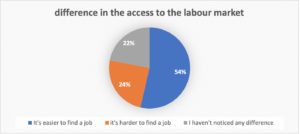
54% of the interviewed thinks that it is easier to enter the labour market than in 2010.
4. If you have noticed any differences, according to you, what are they due to? a. It’s easier to find a job
- to the news project with foreigners
- to the presence, in the area, of a cooperative working in the field of refugee reception, for whichdifferent figures are required
- more opportunities thanks at the presence of migrants
- the management of the reception system has created more job opportunities
- thanks to the opportunities the cooperative gives
- More job opportunities especially for young people; greater initiative and personal investment byrefugees
- In my area of plant engineering, yes
- the differences are due to the establishment of the cooperative, the town’s economy has been rebornand therefore unemployment has decreased because jobs have increased
- at the creation of the cooperative
- because of the opportunities the cooperative gives. If it were not for the cooperative, the businesseswould have closed by now
- In my case I’ve always been an out-of-community potter, now for years I’ve been doing it in Camini thanksto the cooperative
- Thanks to the cooperative that helps citizens find jobs among them young people
- Since the cooperative has been established, several people have found jobs
- Differences are due to the cooperative and the city government
- To the presence in the area of a cooperative through which many people have found work
- The presence of the cooperative, which has enabled several people to find employment14 answers highlight that the establishment of the hosting and integration projects generated a positive impact to the labour market, as it has spawned new job opportunities.
b. It’s harder to find a job
- Demand for skilled workers and lack of job opportunities
- Economic crisis, black labour, few enterprises
- Are due to the needs of today’s
- To the persistent lack of development, bad policyAll the precedents answers underline a lack of investment and a mismatch between labour supply and demand
5. From 2010 to the present, have you seen any differences in labour market access for young people?
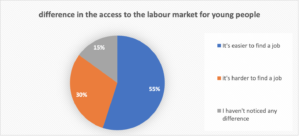
The answers are comparable to the ones obtained at the question 3.
6. If you have noticed any differences, according to you, what are they due to? a. It’s easier to find a job
- Are due to the presence of the cooperative
- Because now there is a bar and many guys have found jobs as bartenders, pizza makers and waiters
- To the demand for increasingly specialized professionals: social workers, language experts, translators
- Most of the workers placed in the welcome center are young people, some of whom have returned froman unsuccessful experience abroad
- Thanks to the opportunities the cooperative gives
- More job opportunities especially for young people. Greater initiative and personal investment byrefugees
- Differences are due to the establishment of the cooperative; the town’s economy has been reborn andtherefore unemployment has decreased because jobs have increased
- Because of the opportunities the cooperative gives, if it were not for the cooperative, the businesses would have closed by now
- Thanks to the cooperative that helps citizens find jobs among them young people
- Since the cooperative has been established, several people have found jobs
- To the reception of immigrants and the founding of the cooperativeAll these answers highlight that the establishment of the hosting and integration projects generated a positive impact to the labour market, as it has spawned new job opportunities.
b. It’s harder to find a job
- The difficulties are due to the increasing demand for highly skilled and trained personnel, as well as the relocation of large companies to countries where labour is cheaper
- Who wants to work the work has always been there
- Economic crisis, black labour, few enterprises
- Labour supply and demand do not coincide, work experience demand, retirement age increase
- Previously more work was done in agriculture and construction, the labour market requires trainedemployeesThe answers highlight a mismatch between labour supply and demand. Furthermore, they underline the fact that the labour market is changing: Camini is located in an agricultural region, where agriculture represented (and still represents) the main work opportunity; but the economic changes are shaping the labour demand.In conclusion, answers obtained at question 3-4 and 5-6 are similar, showing that the cooperative play a central role in the economy of the village.
7. From 2010 to the present, have you found any cultural differences in your town? Traditions are felt you speak in dialect, etc.
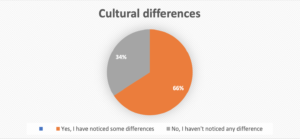
66% of the interviewed have noticed some cultural changes
8. If you have noticed any differences, according to you what are they due to?
- At the presence of migrants, because we exchange traditions, they respect ours and we respect theirs
- Having foreign friends, I learned a lot about their culture and food
- Traditions are still very much felt but they are joined by migrants’ who are welcomed and respected. Thedialect continues to be spoken by most of the population but also by many people in the hosting project
- In my opinion to the comparisons that you have with migrants from different countries.
- The town has been reborn has awakened from its torpor, has discovered the welcoming of migrants. Ittries to free himself from his selfishness and remember that in the past he too was welcomed
- There are different religions, translations are heard and dialect is spoken
- Dialect is still spoken but cultural traditions are being lost over time perhaps less felt by young people
- Culturally, the town has been enriched by the presence of a hosting project that has allowed us toregenerate the community while maintaining what are our traditions and our dialect
- To the arrival of many immigrants from various non-European countries
- Cultural differences in the village are due to the presence of people and families of different ethnicities.
- Although the community of Camini is very much attached to traditions and the use of dialect languageprevails, there is a mutual tolerance of different cultures that, although they are not yet well blended,coexist and share some moments
- As time goes by, traditions are less felt by young people
- There are several cultural differences due to the arrival of so many refugees from many patios of theworld; unfortunately, traditions are also being lost a bit because of the covid; people speak dialect
- I personally perceive a greater attachment to local traditions combined also with a stronger attraction tocultural novelties brought by migrants
- There are cultural differences given the presence of people of different ethnicities and cultures, however,the traditions of origin have remained the same
- Dialect is spoken even if some people do not speak it, but it is not a problem
- Thanks to the cooperative was born the opportunity to get to know people with different cultures, todiscover by putting them also in practice
- I notice accentuated Calabrian traditions and the most beautiful thing to see other cultures “mixing” with ours
- Are also due to the association occasionally holding some events
- Traditions tend to disappear, young people are uncaring
- To the large influx of migrants and visitors who meet in the village
- Linguistic misunderstandings
- Some tradition has been lost due to restrictions due to COVID
- The presence of people of different nationalities contributes to having different languages, cultures,customs and traditions while still maintaining each person’s identity while respecting their traditions
- Local traditions are respected, moreover, a multicultural environment is created with different customsand traditions due to the presence of migrants
- Differences were noticed because of restrictions due to COVID, traditions were lost, and more
- Certainly, the arrival of migrants has brought a breath of fresh air, turned the spotlight on our community19 answers underline the fact that Camini has become a multicultural town. The presence of migrants has brought to a cultural melting pot. Furthermore, the answers highlight the fact that all those cultures co-exist together, without any kind of conflict.
Some answers state that young people are less attached to traditions.
9. Write down the first three things you think of when you hear the word migrant
- A person who comes from a country where there is war
- Escape, refuge, friendship
- Travel, unfortunate, dreamer
- Pain, freedom, rebirth
- Grief, desire to change, return to one’s country of origin
- Are people like us, good and helpful people, people who have overcome many obstacles to be togetherwith their family
- Relocation, distance from the country of origin, poor economic conditions
- Sea, suffering, help
- Hardship, poverty, marginalization
- Person, foreigner, needy
- Welcome, future, hope
- War, poverty, human resource
- Saved in the sea, we are all equal without colour difference, new opportunities
- We are all children of God
- Richness of diversity, healthy mutual contamination, suffering/discomfort of migration
- Assistance, humanity, integration
- War, sea, host centers
- People in need, improve life, seek employment
- People looking for a new life, poverty and war, hunger and love
- We are all the same, we have been given jobs, you have to help everyone for better or worse
- Persone che provengono da un paese o cultura diversa dalla nostra
- Novelty, questioning, cultural mixing
- Novelty, integration, addition of culture
- Person in need of help, person fleeing war
- Poor people, sacrifices, always at war their countries
- Unfortunate people
- Welcome, culture, bonding
- Welcome, need for help, opportunity for someone
- Camini’s non-EU citizens, people see negative
- Person fleeing from unpleasant situations, person who has lost everything, need for job reception
- Different language, culture
- Someone who moves for work, especially young people
- Affection, help, love
- War, sea, work
- Welcoming
- People who go to seek the betterment of their lives, political refugees, people fleeing war
- War, pain, hopeMost of the answers stress the sufferance and pain migrants had to go through; this is often linked with war, poverty and sea (with a clear reference to the crossing of the Mediterranean). These answers shows a high empathy of natives towards migrants.
10. Define who is a migrant
- A person in search of a new life
- A person who moves from his or her place of origin to another place of origin
- A person who tries to make it clear that he should be respected as such
- Courage to improve without betraying and being ashamed of one’s origins
- Is a person who flees their country because of war
- Person who leaves his or her home country to go in search of work
- The human being in search of a better life
- Person who leaves his native country to go to another country where he hopes to find a better life thanthe one he left behind
- Person experiencing socio-economic hardship in their own country
- Lost who move from their country due to economic hardship to find better living conditions
- Who moves to new hopes
- Migrant is one who is forced to leave his land and home for various reasons
- The migrant is a person like all of us, children of God
- Normal people
- Is one who decides, spontaneously or forcibly, to move or move away from his or her living context
- People coming to another part of the world
- One who flees his country because he is forced
- People who move from their country to try to improve their lives
- The migrant is one who leaves his origins, his land in search of a better life, risking his own life to find it
- All foreign persons
- People who come from a country or culture different from our own
- A migrant is a person who comes from a different country for a variety of reasons concerning their land
- A migrant is a person who comes from other cities or countries to carry out projects or goals
- Person from a different country
- A person who seeks to improve his or her life
- If I think of a migrant I imagine a hug, a migrant is a person who is looking elsewhere for a safe embrace
- A person in need of welcome
- An African, a Taliban, an Arab. Once the migrant was a migrant, now an immigrant
- Person fleeing from unpleasant situations, person who has lost everything, need for job reception
- An individual who for various reasons sets out for other states
- Person who for various reasons is in some way forced to leave his or her country
- Someone who moves for work, especially young people
- The migrant is a person in need, so you have to help your neighbour
- He who for a variety of reasons leaves his country in search of a better future where rights and dutiesare respected
- He who, in order to improve his living conditions, leaves his country
- A person who goes in search of a better lifeThese answers are in line with those obtained at the previous question. People stressed the fact that migrants had to move from their country of origin, often due to war or poverty. Other elements often present are hope and the need.
Just one answers can be defined as racist.
11. On a scale of 5, how supportive are you of the presence of migrants in your town?
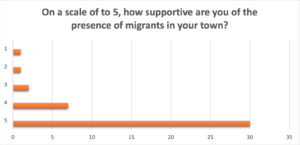
As already underlined, these answers show an high level of empathy and supportiveness of native towards migrants
12. Do you think migration is an opportunity or an obstacle for your town?
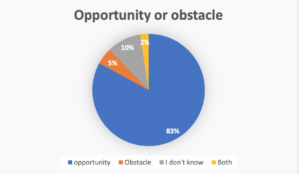
The 83% of the interviewed people thinks migration is an opportunity for their town, while 10% doesn’t have a clear opinion.
The reader should be aware that the 5% who answered that migration is an obstacle, it refers to Italy and not to Camini. People think that migration is an obstacle for the country, this is evident from the answers obtained at question 13, see point d.
13. Why?
a. Opportunity
- Because thanks to them, the town grows more
- Because it’s nice to learn about customs different from our own
- Because it is enrichment, repopulation of a now deserted town, job opportunities, a small window to theworld
- Opportunity for everything
- [It] is a resource for looking ahead and improving
- It gave jobs to those who didn’t have one and repopulated the town that was empty and reopenedschools that were closed
- Because it creates work opportunities
- We can be confronted with realities and cultures different from our own
- Because the good management practices of the migration phenomena represent a job opportunity formany people in the town. The coexistence and confrontation between different ethnic groups representsa richness for the whole community.
- People produce wealth, and wealth produces benefits for everyone
- Because it gives many job opportunities
- Because it serves to confront backwardness, xenophobia and self-centeredness
- Cultural exchange
- Can revive a country in economic crisis
- Because first of all it gives an opportunity and dignity to people who are disadvantaged and who needshelp; and then because as in this case they [the migrants] have revived a town
- Because the town is growing and the country is growing for our sake
- It allows us to discover and compare ourselves among populations with different cultures and traditions. It allows the opportunity for young people especially to work, to open their minds and learn about the outside world, from our small town in which we live
- Because in a small town like Camini interacting with new people, people having a different culture, is crucial. Migration has allowed us to experience a new reality unknown to us, learn about the stories of these people and immerse ourselves in them. It has also fostered the development of new jobs that have helped many families in the village.
- My town has become multi-ethnic, which has given me the opportunity to learn about new cultures, new traditions and new languages
- Brings work
- Migrant presence generates work via cooperative
- Because being able to experience and meet people from various cultures is only enriching
- Ensures jobs and growth for the country
- The town has been reborn, schools have reopened, children and adults have ways to engage withdifferent people and cultures, thus enriching their culture
- Immigration brings sharing of ideas and potential to the whole community
- There is movement, there are more people therefore greater economic turnover.
- Because there is an exchange of cultures and ideas
- Thanks to the presence of migrants, you have the opportunity to discover a multicultural environmentmade up of new knowledge and traditions
- Contributes to the town’s economic recoveryb. Both depends on the person and his willingness to integrate and to be able to adapt to reality especially in a different culture
c. I don’t know
- Because to date I have not seen any substantial effects either in a positive or negative sense d. Obstacle
- Because they are very privileged compared to the Italian population
- Because the poverty and unemployment rate in Italy is so high, and the Italian state only thinks aboutenriching itself with the migrant issue while neglecting its own peopleIn general, these answers stress the fact that the presence of migrants in Camini created many job opportunities through the cooperative and that boosted the economy of the town.
Another element often evoked is the cultural enrichment derived from the presence of migrants in Camini.
(1) Sistema di protezione per richiedenti asilo e rifugiati (Protection system for asylum seekers and refugees), for more information see Camini, the village of hospitality [link to the blog article]



Average Rating